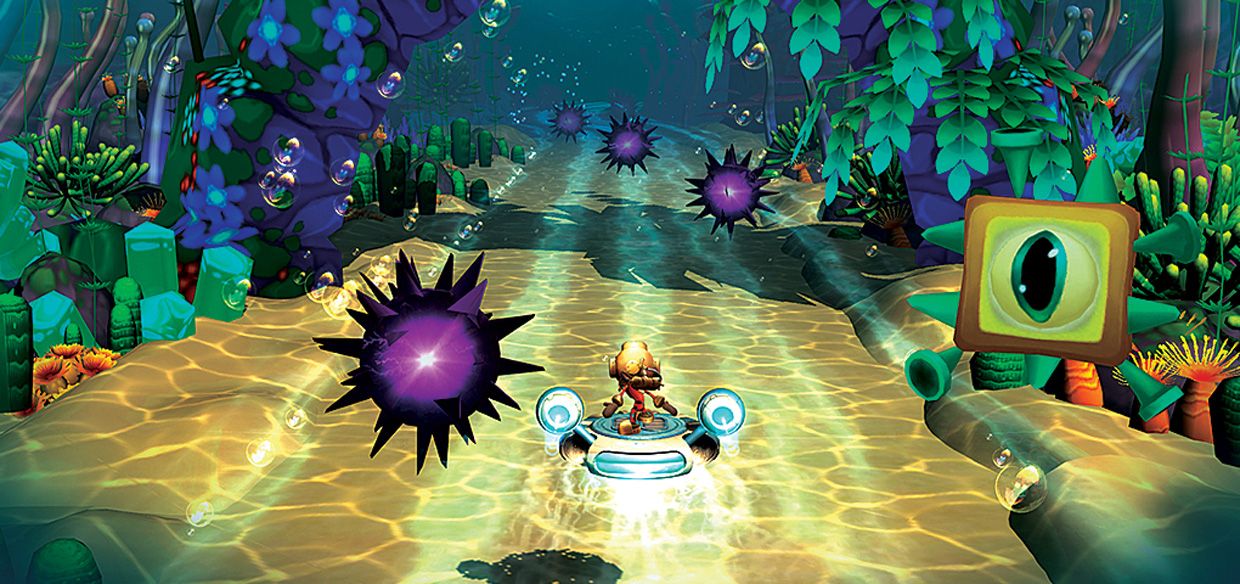Video Game Approved as Prescription Medicine
 Image: Craig Ferguson/MIT Prescription Game Play: EndeavorRx was scientifically designed to challenge a child's brain during ADHD treatment; it demands that the child focus on multiple tasks at the same time.
Image: Craig Ferguson/MIT Prescription Game Play: EndeavorRx was scientifically designed to challenge a child's brain during ADHD treatment; it demands that the child focus on multiple tasks at the same time. This summer, a video game became available by prescription in the United States. This first-ever FDA-approved digital treatment builds on a tradition of gaming as a therapeutic tool that extends back more than a decade. Its game play gets good reviews, too.
As video games have expanded their reach beyond the dedicated platforms (like Nintendo consoles, Xboxes, and PlayStations) where they'd long thrived, to smartphones and tablets, therapeutic games have also made the leap. Some have ratcheted up their intentionally addictive game design-though, according to the developers, not in the service of ad clicks and in-game purchases but rather of self-improvement and therapeutic benchmarks.
On 15 June, the U.S. Food and Drug Administration announced its approval of a first-person racing game called EndeavorRx. Boston-based Akili Interactive Labs, maker of the game, says its racer was originally licensed from the lab of Adam Gazzaley, a neuroscientist at the University of California, San Francisco. The company touts four peer-reviewed studies (in PLOS One, The Lancet Digital Health, The Journal of Autism, and Developmental Disorders) as well as one paper in process as support for its claims that EndeavorRx significantly improves clinical markers of attention in patients with ADHD (attention deficit hyperactivity disorder).
EndeavorRx looks and feels like a traditional game, but it's very different," says Matt Omernick, Akili cofounder and the company's chief creative officer. EndeavorRx uses a video-game experience to present specific sensory stimuli and simultaneous motor challenges designed to target and activate the prefrontal cortex of the brain.... As a child progresses in game play, the technology is continuously measuring their performance and using adaptive algorithms to adjust the difficulty and personalize the treatment experience for each individual."
For Web developer and designer Craig Ferguson, anxiety and depression are both conditions that good video-game design can effectively treat. Depression is a cycle of doing nothing, and then when you do nothing you feel worse," he says. If you do anything that is meaningful for you, that breaks you out of that cycle."
Ferguson, back when he was a developer and designer at MIT's Media Lab, worked with Chelsey Wilks, a psychology postdoc at Harvard. Wilks studies behavioral-activation therapy-a form of depression treatment that promotes activities for the depressive person that break depression's vicious feedback loops.
 Image: Craig Ferguson/MIT Playing with Medicine: EndeavorRx's game play is as effective as a pill or potion.
Image: Craig Ferguson/MIT Playing with Medicine: EndeavorRx's game play is as effective as a pill or potion. It's a well-known fact that so many mobile games use all sorts of psychological tricks to get people to give them money," he says. So we wanted to use the same exact psychological tricks, but to trick [users] into doing something that's good for them."
For instance, he says, last year, the Journal of Medical Internet Research published a study he coauthored with other Media Lab researchers that used a Pokemon-like digital-pet-collection mobile game as a backdoor route to induce patients to self-report symptoms and behaviors. (Typically clinicians who rely on patients to self-report-say, their mood swings or their daily activities-via paper diaries or electronic journals sometimes have trouble with compliance.) Self-reporting using a specially designed mobile game, where they saw 86 percent compliance, outstripped self-reporting via e-journal (78 percent compliance) and paper journals (71 percent compliance).
The Guardians: Unite the Realms, developed by Ferguson and his colleagues, is now available to download for free on both Android and iOS devices.
Using games for physical therapy-especially therapies tied to specific diseases and conditions-sometimes requires a different approach than the increasingly tablet- and phone-based psychological-therapy games, says Pier Luca Lanzi, a professor of computer engineering at Milan Polytechnic.
Lanzi teaches video-game design and development and has been studying therapeutic gaming since 2016, when he first published a paper about developing effective exergames" as forms of therapy.
Lanzi says physical-therapy games require special setups and controllers that often exclude the device-agnostic, touch-screen-only interface of tablets and smartphones. Earlier this year, he collaborated on a study that used a PC-based video game to accompany therapist-designed physical spaces-outfitted with balance boards, tiles, and roll pillows-for patients with juvenile idiopathic arthritis (JIA).
The literature is massive in this field," Lanzi says. But from time to time, you have new sensors that come out, and as the sensor improves and becomes smaller, it can be worn. You can actually do much more."
So although Lanzi and his collaborators' current-generation JIA therapy game uses the discontinued Microsoft Kinect motion sensor, their paper notes the expanded game-therapy possibilities that newer sensing technologies like the rebranded Azure Kinect and Intel Real Sense Depth Camera can provide.
Of course, virtual reality also has applications in the therapy gaming field. However, Lanzi adds, not every therapy scenario will be ideal for VR. Physical rehabilitation, for instance, requires a patient to remain aware of his or her body and how it moves through space. VR tends to shut that sensory feedback down.
VR gaming, he said, shows much more promise as a form of cognitive rehabilitation-for, say, stroke survivors or autistic patients.
Whatever the form of screen, he said, therapy games can, at best, introduce a sense of fun to physical therapies that can otherwise be tedious or worse.
In JIA, exercises are very painful for the joints," Lanzi says. They're also very repetitive. So you try to find something that's enjoyable. Something that makes the time pass by.... We try to make it feel like it's not rehabilitation at all."
This article appears in the August 2020 print issue as Prescription-Strength Gaming."